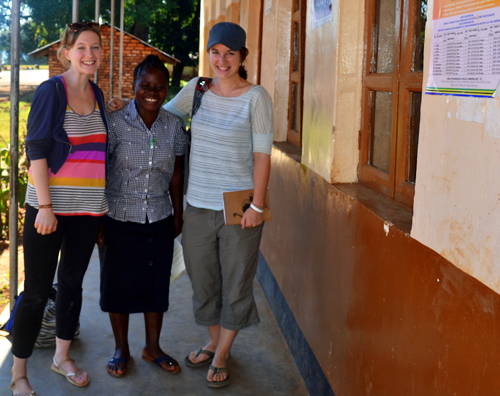
Help a chicken farmer, help a country. That’s the idea behind a development project that has already taken several Guelph veterinary students to rural Tanzania, including this past summer. Now organizers hope to ramp up efforts to improve livelihoods among even more subsistence farmers in the East African country.
Under the project run by Veterinarians Without Borders/Vétérinaires sans frontières-Canada (VWB), U of G veterinary students have worked with chicken farmers scattered around Rungwe district in southwestern Tanzania. “We want to connect more of these villages together,” says Adam Little, who is helping to co-ordinate student visits overseas while completing the final year of his DVM.
Farmers there lack capacity and resources, he says, but “a properly managed poultry industry in these communities is achievable and valuable because it provides a consistent source of revenue. In addition, the outcomes of human, animal and environmental health are increasingly linked, and the veterinary profession is optimally poised to address these concerns.”
Interests in sustainable development brought Shona Kowtecky to the VWB project. She spent this past summer in Tanzania with Tara Plante; both are third-year DVM students at Guelph. “We were working to educate farmers on how to raise chickens,” says Kowtecky.
Working with a Swahili-speaking poultry expert, the students surveyed about 75 farmers around Ilima to learn what they knew about such issues as vaccinations, livestock feeding and watering, and parasite control. In workshops with local producers, they shared information about everything from building coops to preventing disease, including Newcastle disease, a common poultry affliction.
They also expanded the project beyond Ilima to a nearby village and trained “teacher farmers” to reach other smallholders in turn.
The poultry project was begun in 2006 by VWB member and U of G grad Roger Thomson. It involves chicken breeding and farmer education and support.
“It was a wonderful experience,” says Kowtecky. “The people were just so friendly.” She says one teacher farmer encouraged her students to donate what money they could spare to an emergency fund. “It was something so simple, but it’s an insurance policy they lack.”
Both Kowtecky and Plante had volunteered earlier in Central America and South Africa.
“I was looking for something more long-term,” says Plante, who is originally from Rhode Island. After her undergrad in Massachusetts, she came to Guelph and looked into both VWB and Global Vets. “I wanted to do international work. I think it’s exciting, going to different countries and experiencing different cultures.”
While in Tanzania, the students lived in a borrowed room and learned to put up with inconveniences from lack of running water and intermittent electricity to rickety overcrowded buses.
Referring to the latter, Plante says: “They pack as many people on as they can. Children and chickens and bags of rice – it’s crazy.”
Read more about her experience on her blog.
Little’s interest in international development grew out of a first-year seminar course in environmental politics, science and policy taught by U of G president Alastair Summerlee. The DVM student has visited Tanzania twice and hopes to return in 2013. He’s interested in using cellphones and texting to help connect subsistence farmers and share information.
Little has also visited Botswana and Ecuador and has taken part in a program of the Global Initiative for Food Systems Leadership.
Launched in 2005, Veterinarians Without Borders/Vétérinaires sans frontières-Canada runs programs in South and Central America, Africa and Asia.
[slideshow gallery_id=”1″]